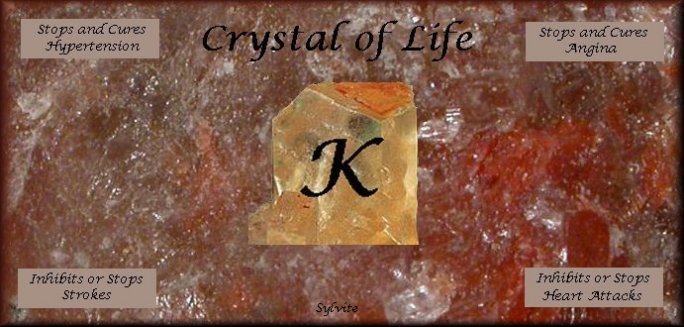Despite the Yanomami's overall levels of sodium being incredibly low, researchers who examined more than 10,000 of these cheerful people found that there was a direct correlation between marginally increased sodium intake and increased blood pressure. "... a highly significant statistical relationship was observed between sodium excretion and systolic blood pressure for the 10,079 participants. The higher the urinary sodium excretion [and, therefore, the sodium intake], the higher the blood pressure."
The reader should remember that for the Yanomami Indians, normal blood pressure averages out at 95/60 and does not increase with age. Try comparing this with the AMA western 'normal' blood pressure of 120/80, which then goes up in incremental steps as you ingest more sodium and lose more potassium while getting older. Of course, the medical apologists will claim this is because we are more civilized, have evolved, and are thus 'different', but rest assured this is pathetic rubbish.
The only significant difference between the Yanomami and Americans or Australians, is that the Yanomami are stuffed full of healthy potassium, while we are stuffed full of toxic sodium. The researchers also noted that another benefit for the Yanomami related to their lack of obesity. "Adults of industrialized populations have an increase in weight with age. The Yanomami Indians did not increase their weight with age." Short, but to the point. Somebody remind me to add "obesity" to my shopping list of potassium deficiency-related ailments.
Those western ladies with a slight weight problem, should resist the temptation to pack their bags and rush off to the headwaters of the Orinoco River. Yanomami husbands are hot on protocol, and do not take kindly to the lady of the house sneaking off into the bushes for a quickie with one of the young bucks. If caught in such a situation, the wife can expect her husband to fire a sharp hunting arrow into the fleshy part of her buttocks. Not enough to kill, but certainly enough to stop her lying on her back for several weeks thereafter. Some choose to call this behavior "barbaric", while others suggest that it merely reinforces strong family values. And oh, yes, before I forget, the favorite supper dish is barbecued frog.
Of course, to prove that any of this Yanomami potassium stuff is relevant to western folk, medical 'science' demands that you must have western guinea pigs for 'controlled trials'. I am one of those guinea pigs, though the trial was controlled strictly by me without independent medical observers, which means that my testimony is suspect at the very least, and I should probably not to be believed. Quite frankly I don't give a damn about that, but the information might be of use to someone out there who either already has cardio-vascular problems, or is seriously interested in avoiding cardio-vascular problems at any time in the future.
For more than 25 years I suffered from 'essential hypertension', in other words high blood pressure that the medical fraternity cannot explain. During that period about eight different medical doctors gave me a staggering variety of 'patent medicines', none of which produced a steady reduction of blood pressure, though on two notable occasions the medicines caused 'bad reactions' which dropped my blood pressure so low and so suddenly, that my wife could barely get a reading. At no time during this 25-year period did any of the medical doctors suggest that it might be a good idea to measure my serum electrolyte levels, in order to check for potassium deficiency. As you might expect, this entire sequence put me off the medical profession in a very big way.
Towards the end of 2003 I started getting the classic signs of 'angina', which, over the next six weeks, rapidly progressed into 'unstable angina', a textbook case involving an accelerating or "crescendo" pattern of chest and back pain that lasted longer than ordinary 'angina'. This was accompanied by acute breathlessness, especially after even moderate exertion or a small carbohydrate meal. The fact that the medical profession did not know the cause of 'angina' infuriated me, because everything on the planet is caused by something else.
My basic knowledge of chemistry indicated that I might be suffering from a sodium overdose, so although in extreme pain and at times barely conscious, I managed to hook up to the Internet and do a few basic Google searches. The only sodium overdoses I could find were those caused by various synthetic drugs, so I reversed my search pattern and tried "potassium deficiency" instead. It was then that I discovered my medical 'angina' symptoms precisely matched those exhibited by a person suffering from an acute potassium deficiency. This information came as no great surprise. On the face of it, I had uncovered the underlying cause of medical 'angina', the latter credited with the sale of more than a billion dollars worth of synthetic 'patent medicines' every year.
The problem was knowing what to do next. In Australia I was limited to 100-milligram potassium pills from the health food shops, or to a product called "Slow K" available from some pharmacies. Basically Slow K is a slow-release 600-milligram chunk of potassium chloride, which allows a 'non-lethal' dose of potassium to be administered under the direct control of the pill, rather than under the control of its recipient. The problem here is that all chunks of salt are biochemically "hot', meaning that as the sugar coating wears off the outside of the pill, the chunk of undissolved salt is exposed, and can then come into direct contact with delicate internal tissues. In my casual view, this could easily cause some sort of perforation or an ulcer.
Clearly what I needed was an industrial quantity of potassium in free flowing 100% water soluble form, which would allow me to first dissolve the potassium in water and fruit juice, thereby ensuring that no salt 'hot spots' could later cause problems in my digestive tract. In the end I settled for a kilogram of AR [Analytical Reagent] grade potassium chloride salt from a chemical warehouse, mercifully not yet under the direct control of the American FDA, or the Australian AMA.
Cost wise this was also a plus, because the whole kilogram set me back a mere US$30.00 including taxes, which is cheap enough when you realize that my potassium chloride purchase contained approximately 620 grams [or 620,000 milligrams] of the same potassium the FDA has restricted to 100-milligrams per dose in the health food shops. You do the math. Pop down to your local health food provider and ask for a quote on 6,200 x 100-milligram potassium supplements. Be ready to write a very large check.
By this stage there was so much pain so often, that I made a personal executive decision to attempt to slowly try to absorb a minimum of 50 grams or 50,000 milligrams of potassium, representing about 1/5th of the 250 grams total that an adult male should contain within his body. Simple common sense suggested that such an acute deficiency, with the extreme symptoms I was suffering, could hardly be caused by a minor reduction in whole body potassium, and, quite frankly, I also wanted the stop the overwhelming pain before it had a chance to accelerate into a fatal stroke or heart attack.
With this in mind, I dissolved 4 grams [4,000 milligrams] of potassium chloride in water and fruit juice, slowly swallowed the lot, and then kept grimly repeating this process every eight hours. After about five days [or 60,000 milligrams] most of the pain had gone, but I was still incapable of truly coherent thought. It was not until I was well past the 110,000-milligram mark that my faculties truly returned, though by then I was so exhausted I could no longer write or use the computer.
Expressed in the same terms used by the FDA, in ten days I had slowly ingested 68.2 grams of dissolved potassium [68,200 milligrams], or sixty-eight times the maximum quantity permitted under American law. However, it should also be noted that this figure represents only five days of the maximum quantity administered by licensed American doctors to their hypertensive patients during the nineteen forties, before their research funding was mysteriously and abruptly withdrawn. When viewed in the latter context, my actions do not seem unreasonable.
At the end of the ten day period, all of my 'unstable angina' pain and breathlessness had vanished completely, and along with it most of the 'essential hypertension' that plagued me for more than twenty-five years. Nowadays I take a daily maintenance dose of 2,000 milligrams potassium per day [3,200 milligrams of AR grade potassium chloride salt], plus 200 milligrams of magnesium orotate to minimize losses.
Though medical doctors might rave about me illegally 'giving medical advice without a license', I am doing no such thing. In the first place potassium is a naturally-occuring mineral essential in our diets for normal development, which places it firmly in the 'nutrition' rather than 'medical' basket. Secondly there is no way that any government agency can prevent determined people from getting their hands on potassium chloride if they really wish to do so. The material is produced in bulk and used for hundreds of applications. For example, about every third oil rig drilling in the Rocky Mountains probably has about 25,000 pounds of the stuff, neatly stacked in sacks at the edge of the rig site.
There are less difficult ways of obtaining potassium, especially in America where there are a range of "No Salt" products, most of which simply replace sea salt with potassium chloride. Fruit and vegetables grown in strict organic rotation on properly maintained soil will probably contain significant quantities of potassium, though it is very difficult to check precisely. Although I have the necessary knowledge required to test for potassium in a range of different substances, I lack the laboratory equipment needed to do so consistently.
On a closing note, try not to believe the advertising garbage that keeps telling you the banana has the highest level of potassium known to man, because it is a lie. If grown side by side on suitable soils, the humble jacket potato has more than four times as much potassium as the banana, weight for weight. This might bring a wry smile to the face of many an Irishman, whose ancestors were forced to live on a 'poor' diet of potatoes in Ireland more than a century ago. The reality is that those potatoes, so very high in potassium, gave the Irish the huge strength and endurance they needed to build bridges and lay railroads half way round the world. Looking back briefly on the Yanomami Indians, it is not hard to see why.




